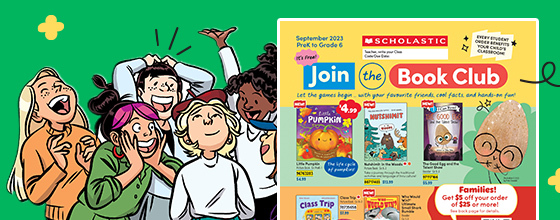Originally published by Scholastic Parents on May 2, 2022
Want to get the whole family reading more? Creating book goals turns reading into a fun activity that your kids will look forward to in their free time. These are five tangible family reading goals teachers hope you make.
Reading one extra book to your young child each day can have a huge impact on their language development. That’s because just one daily book can expose them to an extra 600,000 words every year, according to the most recent Kids & Family Reading Report™ (Canadian Edition). It’s okay if books are repeated!
And of course, if you don’t have a reading routine with your child in place already, an easy goal like reading one book per day together is a great place to start, says Franki Sibberson, a fifth grade teacher in Dublin, Ohio.
Be intentional about book talk, says Sibberson. For instance, at dinner, ask questions you might not know the answers to, such as, “What did you read today that you loved?” Talking about books gets kids more eager to read, and makes it a natural part of their everyday life.
You can also stoke excitement by talking about how you’re looking forward to certain new releases, and getting your child’s take on which ones they’re looking forward to the most.
“When we think of reading, we often forget the beauty that poetry can offer,” says Justine Bruyère, PhD, a former elementary school teacher and lecturer of reading education at Vanderbilt University. Poems can expand your child’s vocabulary and are easy to memorize because of their often rhyming, lyrical structure.
Sit down with a book of poems and let your child choose what appeals to them.
Set up books in the living room, and have everyone read and trade their favourite books. Showing how fun it can be to share books with loved ones will instill a love of reading in your child.
Also look out for when your child’s favourite authors host a virtual book reading or talk. “This builds a personal connection with an author that makes your child feel like an insider,” says Sibberson. “It’s also great for your kids to feel the energy and excitement around a book and author.”
This school year, don’t just close a book when you’re done reading it. “The text is a springboard for everything else,” says Bruyère.
Read the same book together a few nights in a row, then ask your child: “What do you think this story would sound like from this other character’s point of view?” or “Close your eyes and imagine you were there. What would you do?”
These types of questions encourage critical thinking and can help you gauge your child’s reading comprehension. Encourage your child to ask you questions, too.
 Book Clubs
Book Clubs
Scholastic Book Clubs helps kids discover the joy of reading. Together, we put can’t-miss books into kids’ hands—at can’t-miss prices, while also giving back to a teacher's classroom!
Visit us online Book Fairs
Book Fairs
Bookjoy or bust! Millions of children have discovered books—and a lifelong love of reading—at a Scholastic Book Fair.
Visit our site